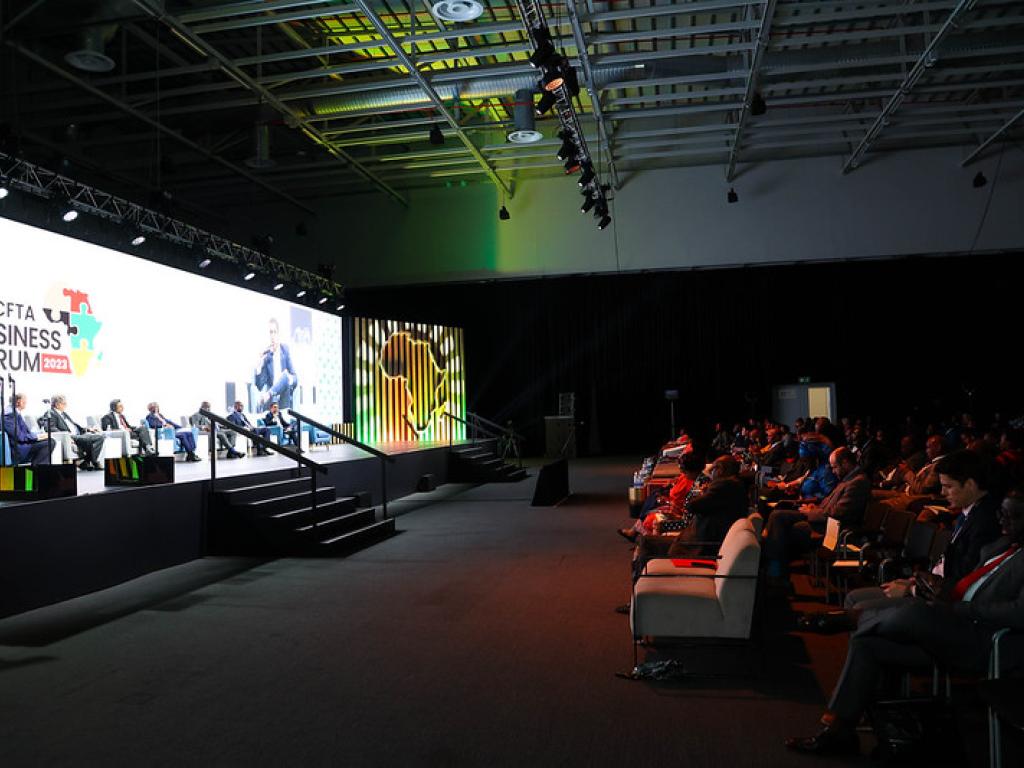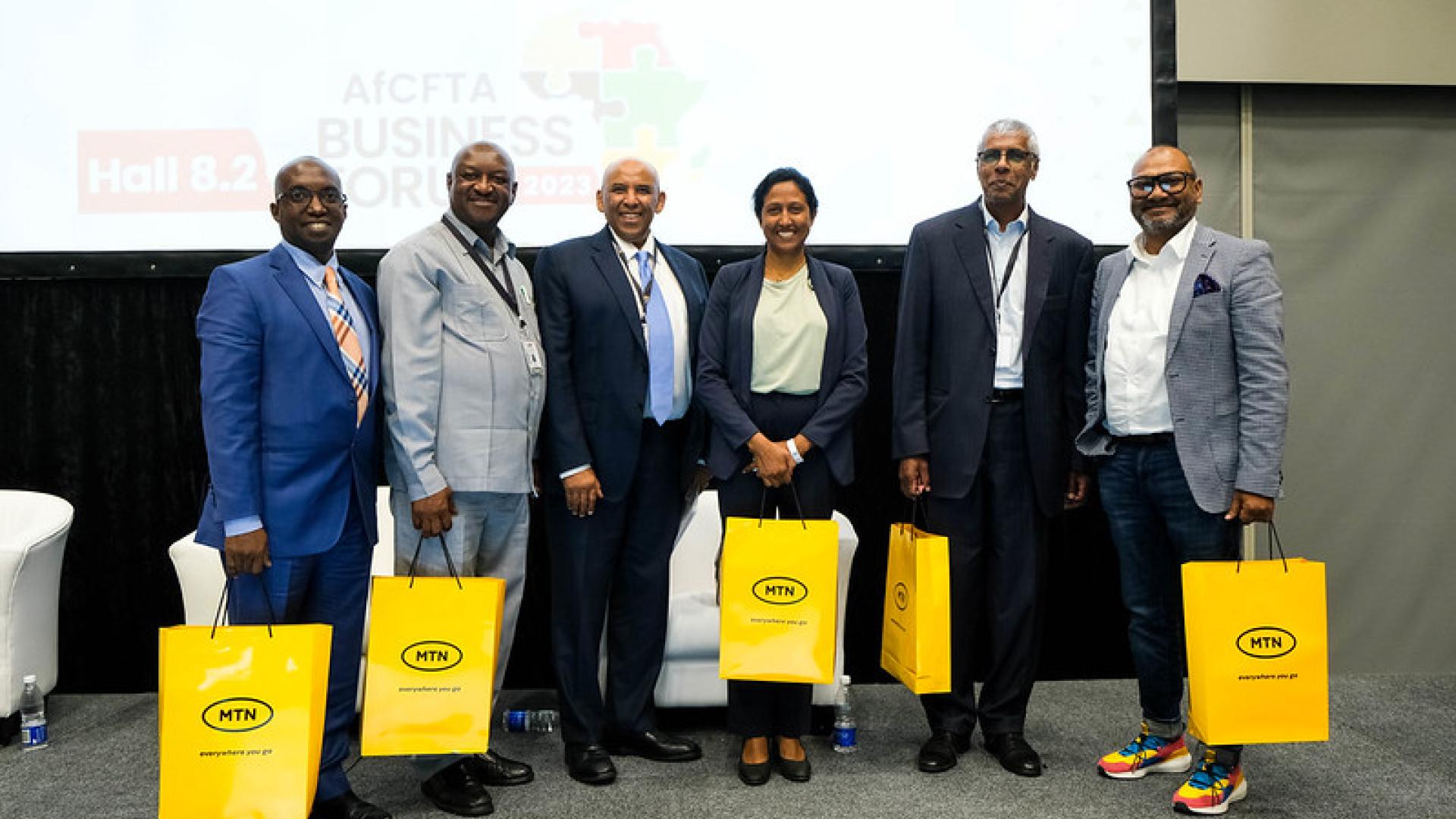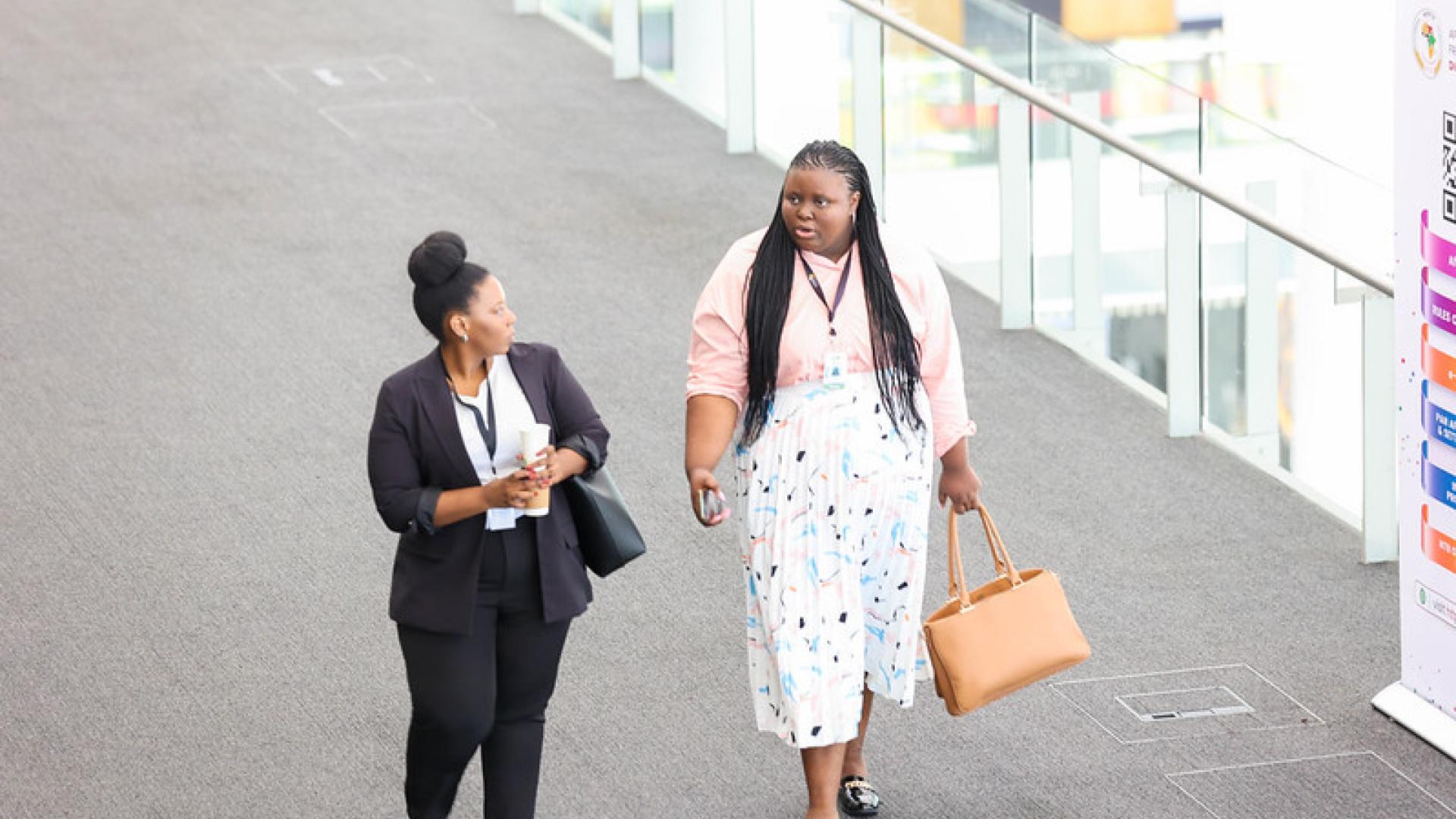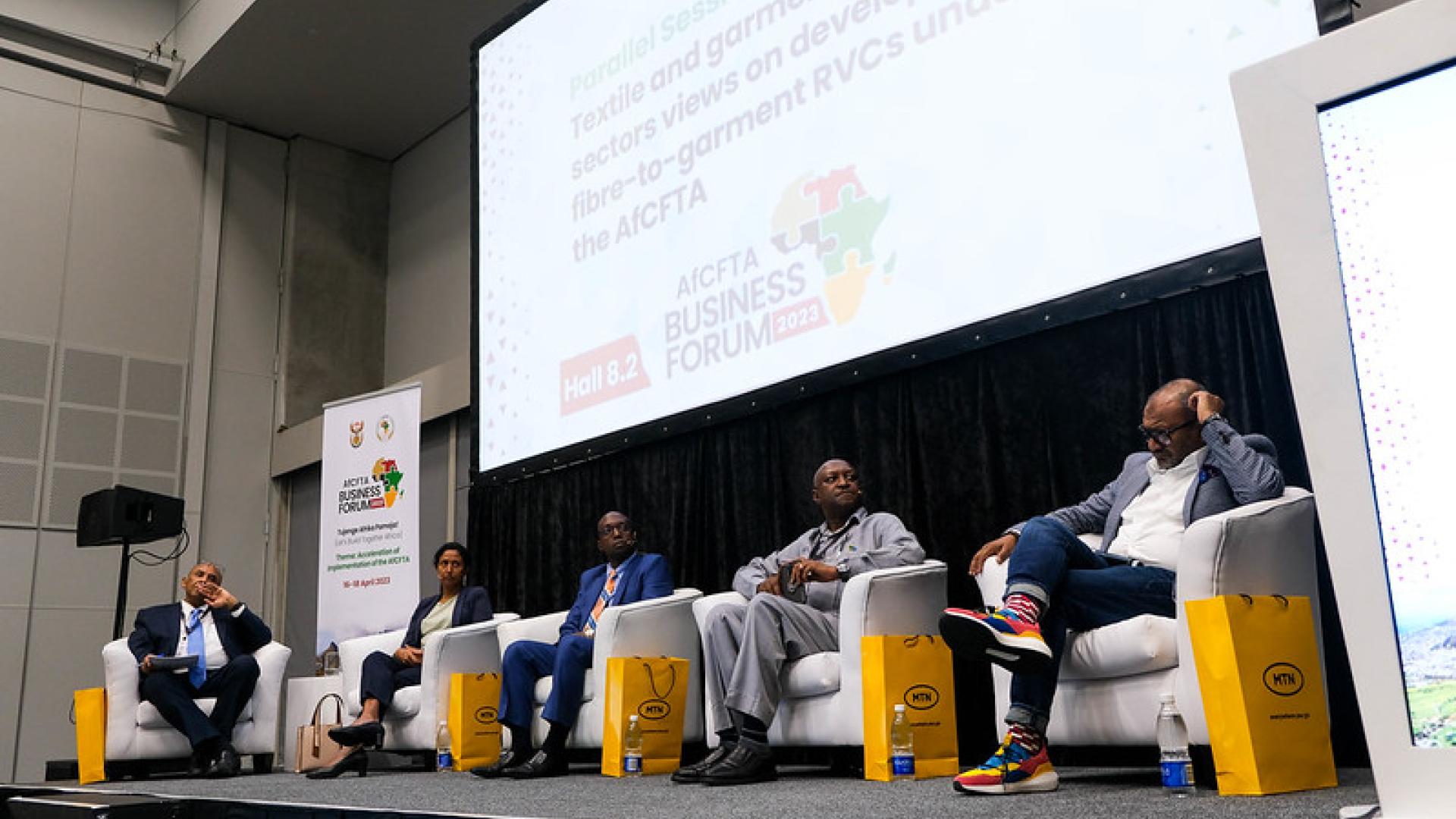Creating One African Market | AfCFTA Key Updates

The Nelson Mandela School of Public Governance, located at the globally recognised University of Cape Town (UCT), is building a world-class African Policy School to develop the next generation of Africa's ethical leaders.
The School is founded on five thematic pillars, which govern all aspects of the School’s activities:
- Democratic governance
- The AfCFTA and developmental regionalism
- Climate change and sustainable development
- Social inclusion – vaccines and public health
- Public policy implementation
These five themes are strategically important to Africa’s long-term transformation and development.
The School is focused on the AfCFTA and regional development, and has teamed up with the AfCFTA Secretariat to help bring together the 55 countries of the African Union (AU) and eight Regional Economic Communities (RECs) in order to create a single market for the continent, which will become the largest free trade area in the world.
This newsletter provides an update on the activities undertaken by the Nelson Mandela School to support the AfCFTA Secretariat during the review period of July 2022 to July 2023.
AfCFTA Trade and Industrial Development Advisory Council
The AfCFTA Trade and Industrial Development Advisory Council, which was launched in February 2022, held its first meeting on 22 - 23 July 2022, Labadi Beach Hotel, Accra, Ghana.
At the meeting, Professor Faizel Ismail gave a short introduction, welcoming all AfCFTA Trade and Industrial Development Advisory Council members. The primary objective of the meeting was to operationalise the Advisory Council that was established in February of the current year.
The council members acknowledged their responsibility to provide guidance to the Secretary-General and the AfCFTA Secretariat in various aspects such as negotiations, trade, industrial development, and capacity building to promote the objectives of AfCFTA.
During his opening address, the Secretary-General of AfCFTA, H.E. Wamkele Mene, emphasized the Council's role in helping with the operationalization of AfCFTA. He also highlighted that AfCFTA will focus on industrial development along with trade liberalization, requiring the development of an industrial action plan to support it.
The Secretary-General further emphasized the importance of the AfCFTA Academy, which will help member states gain expertise and implement AfCFTA effectively. One of the main outcomes of the meeting was the establishment of three working groups, with the responsibility of developing a work programme for the Advisory Council as follows:
- Working Group 1: Regional Value Chains and Outstanding Phase 1 Issues
- Working Group 2: Phase II issues (Intellectual Property, Competition Law, Investment Law, Digital Trade
- Working Group 3: The AfCFTA Academy

The Advisory Council members agreed to participate in different working groups based on their expertise and preference. Read full meeting report here.
The AfCFTA Academy: Masterclass Series
As part of Working Group 3, which deals with the AfCFTA Academy and in fulfilment of the AfCFTA Secretariat’s capacity-building mandate, the Nelson Mandela School developed a masterclass series, with each masterclass set comprising 3 – 5 masterclasses delivered over the course of one week. The purpose of the masterclass series was to offer actors across the continent, who will be involved in the negotiation and implementation of the AfCFTA, as well as staff members within the newly established AfCFTA Secretariat, grounding in a set of foundational and core topics important to understanding the context and potential of the AfCFTA.

The masterclass series was launched in March 2023 as an online offering. Rather than offering technical training, the masterclasses seek to integrate perspectives rooted in economic development, trade, democratic governance, and international political economy to offer participants the historical context and a range of perspectives and lenses through which to critically analyse important trends and changes in the global environment and appreciate their impacts on Africa. This will position participants to appreciate the key challenges facing and opportunities presented by the AfCFTA to advance the continent's transformation.
The masterclass offering also seeks to build participant negotiation skills by enhancing their understanding of the political as well as technical aspects involved in a range of topical areas and the negotiation process. The masterclass series is therefore open to officials involved in negotiating or implementing the AfCFTA from across the continent. Participants have varying levels of training in different areas (some in law, others in economics, etc.); many are specialists in a particular area, with very limited knowledge in other areas.
The following masterclass sets have been completed:
1. Development and Under-development in Africa
2. Africa’s Industrial Transformation
3. Approaches to Regional Integration and the AfCFTA
4. The Global Multilateral Trading System and Changing Global Economy
5. Africa’s Bilateral Trading Relationships
6. The AfCFTA, Climate Change and Africa’s Transformation
The masterclass series has been very well received thus far. Core strengths of the masterclass offerings that have contributed to its high quality include; strong relevance to the audience, excellent contributors and high-quality contributions from across the continent and world, and the development of a consistent and highly engaged audience.
The rich information obtained within each masterclass provides a foundation for developing online certificated executive education courses. To ensure that the delivery of the online courses can occur at scale, partnerships have been forged with institutions such as the UN Systems Staff College, SOAS and Sciences Po. Partnerships are also being established with institutions on the African continent, with the expressed intention to strengthen institutional capabilities. Read full report on the masterclass series.
The AfCFTA Business Forum
During the AfCFTA Business Forum, the Advisory Council held a roundtable on Cotton, Textiles and Apparel regional value chain. The private sector actors that have engaged with the AfCFTA Trade and Industrial Development Advisory Council through roundtable discussions and industry engagement expressed their commitment to cooperating with the AfCFTA Secretariat and Advisory Council to integrate the continent and build competitive regional value chains from cotton and other fibres to textiles, garment to retail.
To accelerate the discussion and activate awareness around trade and investment opportunities in the fibre-to-garment value chains, the AfCFTA Trade and Industrial Development Advisory Council, in collaboration with AfCFTA Secretariat, hosted a fibre-to-garment deep dive plenary session: Private Sectors' Views on Developing Fibre-Garment Regional Value Chains (RVCs) under the AfCFTA on 18 April 2023 during the AfCFTA Business Forum. Read full report on the AfCFTA Business Forum 2023 Deep Dive Plenary Session.
Working Group 1: Regional Value Chains and Outstanding Phase 1 Issues
Working Group 1 is currently drafting a continental strategy for the regional cotton, textiles, and apparel value chain. In this regard, several multi-stakeholder meetings have been held. These meetings culminated in three working groups being constituted to draft a multi-stakeholder strategy on cotton, textiles and apparel.
Additionally, the AfCFTA Trade and Industrial Development Advisory Council adopted the following three-step process focused on engaging with the private sector in identifying and unlocking constraints to the development of RVCs:
- Step 1: Research focused on mapping and profiling the continent's cotton, textile and garment value chains.
- Step 2: Engaging the private sector in developing a shared vision for the development of RVCs.
- Step 3: Develop a programme of action to implement the vision focused on building competitiveness, attracting investment, and understanding the rules and regulations required to develop national and regional value chains.

At the AfCFTA Business Forum held in April 2023, it was emphasized that there is a need to develop a continental strategy for Cotton, Textiles and Apparel. The side event also highlighted the importance of developing strategic interventions and policies focused on building regional value chains for cotton, textiles, and apparel. There is also a need for the private sector to lead in developing a five-year strategic plan for fibre-to-garment as well as its active participation in the working groups as outlined below.
1. Investment, sustainability, and innovation
2. Developing manufacturing capabilities & export competitiveness
3. Addressing Non-Tariff Barriers
The above-mentioned Working Groups will guide the development of the continental fibre-to-garment five-year strategic plan.
Additional Working Group Meetings
The three industry-led working groups (WG) as outlined adopted terms of reference (ToRs) highlighting the responsibilities of the WGs as well as the focus areas for each WG. The WGs work in close consultation with the AfCFTA Secretariat and Advisory Council. The main objective of the WGs is to address challenges and encourage the developmentof fibre-to-garmet value chains under the AfCFTA.

Each WG has had two virtual meetings thus far (during July and August 2023). The WG meetings have outlined the (1) focus areas and priority issues based on WGs principal responsibilities/focus areas and (2) WG modalities. It has been agreed that each WG will meet monthly, and a bi-monthly combined WG meeting will also be convened.
Subsequent to the initial meetings of the working groups held in July and August more technical experts have been invited to participate in the working groups. Additionally, WG members will provide strategic direction in undertaking the principal responsibilities/focus areas, with outputs contributing to the on-going RoO negotiations. Most importantly, the WG outputs are to contribute to the development of a 5-year strategic textile and apparel RVC plan. The AfCFTA Secretariat and Advisory Council are to contribute towards the operationalisation of WG suggestions.
Pharmaceuticals
The AfCFTA Secretariat and ODI are supporting the Nelson Mandela School’s work on pharmaceuticals. A concept note has been drafted and shared with the ODI to fund the development of a continental pharmaceutical strategy. Under the pharmaceuticals and vaccine manufacturing regional value chains, the Nelson Mandela School, in collaboration with ODI is developing a pharmaceutical and vaccine sector strategy for the continent that will inform the development of regional value chains linked to the AfCFTA with a core focus on developing local manufacturing capabilities. The approach will be to conduct a detailed landscape analysis, based on available data, on critical attributes of the sector in Africa. A platform for dialogue and research with key thought leaders will be convened, bringing together individuals from diverse backgrounds and geographies to contribute towards progressing the agenda of the development of a comprehensive strategy vision for the pharmaceutical sector in Africa in the context of the AfCFTA. Read summary reports for Roundtable 2 and Roundtable 3.
Publications
- Working Paper: The AfCFTA and Transformative Industrialisation webinar series. Read more
- Working Paper: AfCFTA and rules of origin for the textile and apparel industry in Africa. Read more
- Opinion Piece: Make public procurement mechanisms accessible to local manufacturers of health products. Read more
- Journal Paper: Faizel Ismail (2023): Beyond the just energy transition narrative: How South Africa can support the AfCFTA to advance climate resilient development, South African Journal of International Affairs, DOI: 10.1080/10220461.2023.2228317. Download here
- Book: Ismail, F. 2021. The African Continental Free Trade Area (AfCFTA) and Developmental Regionalism: A handbook. Trade & Industrial Policy Strategies. 134pp. ISBN: 978-92-9162-053-1 Download here




